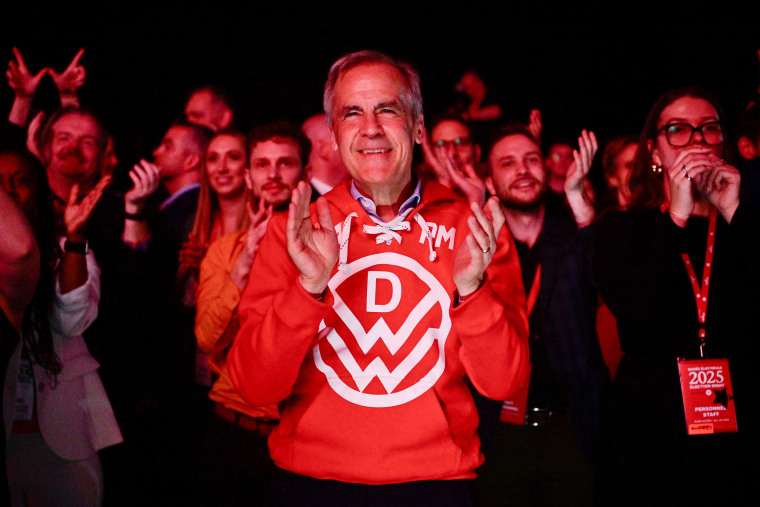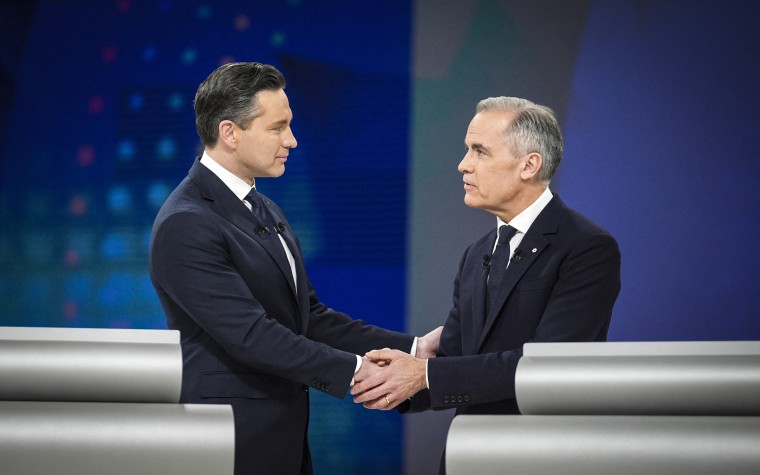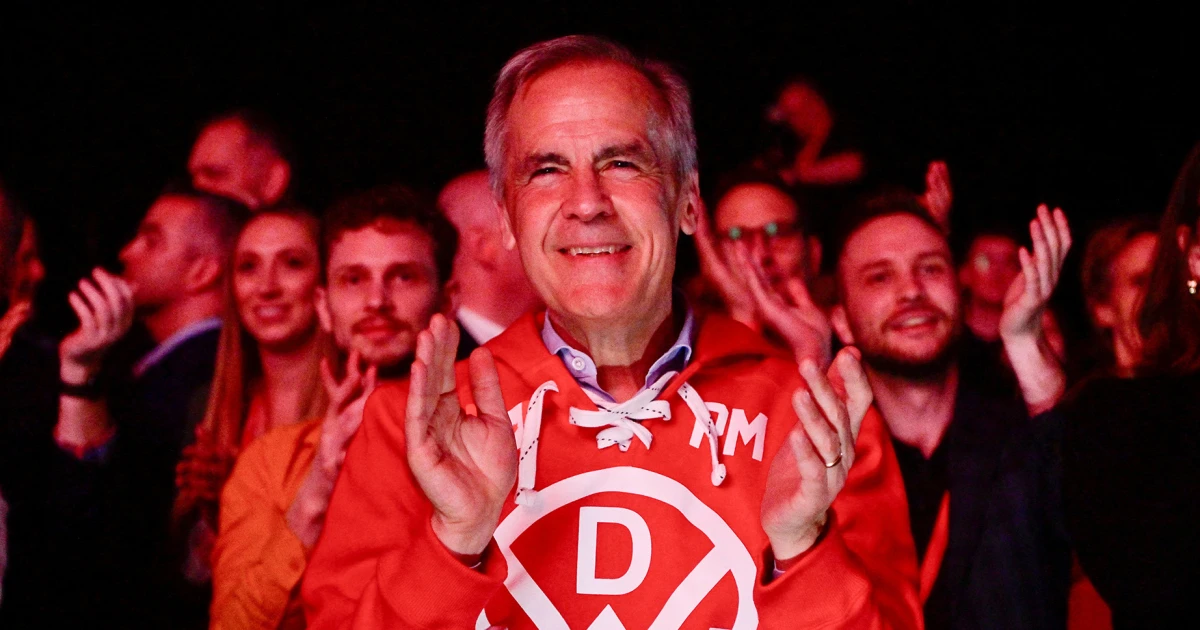Before this week’s federal election in Canada, Derek Ouellette and his wife, Yecenia Ouellette, could never have imagined voting for anyone but a Conservative.
“We were both raised Conservative and we both kind of thought, Conservative is just what you do,” Derek Ouellette, a 46-year-old insurance broker from Belle River, near Windsor, Ontario, said in a phone interview late Tuesday.
But Ouellette said he was proud to have done the once unthinkable, voting for Liberal leader and Prime Minister Mark Carney, who is projected to have secured a minority victory in this week’s poll.
Across social media, a number of once-dedicated Conservatives said that they would be casting their ballots for the Liberal Party this week for the first time in their lives. Many described their vote as a rejection of “Canada’s Trump” — Conservative leader Pierre Poilievre — and his aggressive campaign, which experts say appeared to pull from the playbook of President Donald Trump.

Canadian Prime Minister Mark Carney applauds Tuesday following his party’s election victory.Jennifer Gauthier / Reuters
“There were some elements of his campaign that echoed Trump,” Roland Paris, director of the University of Ottawa’s Graduate School of Public and International Affairs, said Wednesday.
That included talking “about eliminating wokeism” and “referring to his political opponents with nasty nicknames,” Paris added. “None of these features of his campaign helped him once Trump came to be seen by many Canadians as an enemy of Canada.”
Just weeks ago, the pugnacious approach of Poilievre, who had previously allied himself with the so-called Freedom Convoy that protested vaccine mandates for truck drivers, appeared to be working.
His campaign, during which he focused on small-government and libertarian issues, combined with dissatisfaction at the scandal-hit Prime Minister Justin Trudeau’s handling of the economy to see the Conservatives move 24 points ahead of the Liberals in January, according to a poll tracker run by the Canadian Broadcasting Corporation.
But within a matter of weeks, everything changed: Trudeau announced his resignation Jan. 6, while Trump swept back to power in the U.S., threatening to use economic pressure to annex Canada as the “51st state,” before imposing sweeping 25% tariffs on goods from America’s northern neighbor and sparking outrage across the country.

Derek Ouellette, 46, with his wife, Yecenia Ouellette, 41.Courtesy of Derek Ouellette
Trump’s bellicose remarks gave a huge boost to Canadian nationalism, with many vowing to boycott the U.S. and its products.
As anti-Trump sentiment grew across Canada, Poilievre’s own bullish rhetoric rapidly lost its sheen for many Canadian Conservatives.
When Carney, the former governor of the Bank of Canada and the Bank of England, was named Canada’s interim prime minister and the Liberal candidate for the 2025 election, distaste for Trudeau and worries about the Liberals’ ability to handle the economy quickly evaporated.
When it did, a new way forward emerged for those who had felt politically homeless.
Poilievre, now the former leader of the opposition, even lost the parliamentary seat he had held for two decades to a Liberal neophyte Monday.
‘Maple MAGA’
“Listening to Poilievre speak, it’s like talking points from Trump,” Ouellette said. “It just reeks of what’s happening south of the border.”
By comparison, he added, Carney “has shown himself to be very decisive in dealing with Trump” by billing himself as candidate who could stand up to the president.
“I just cannot support the hate rhetoric … and this ‘Maple MAGA’ movement that’s happening here in Canada,” said Chantal Dugdale, 57, another Conservative who voted Liberal for the first time in her life Monday.
Dugdale said she found parallels between Poilievre’s campaign and support base, and Trump’s “Make America Great Again” movement particularly off-putting.
“We need unity. We need to be together. We need positive messaging,” said Dudgale, who is from Barrie, just north of Toronto, and works in marketing and sales.
Trump appeared aware of his likely impact on Canada’s election, saying in an interview conducted last week, but published by The Atlantic on Monday that until he “came along, remember, that the Conservative was leading.”

Conservative leader Pierre Poilievre and Canadian Prime Minister and Liberal Party leader Mark Carney in Montreal earlier this month.Christopher Katsarov / Pool via AFP – Getty Images
“Then I was disliked by enough of the Canadians that I’ve thrown the election into a close call, right?” he said.
A close call indeed, with Ouellette, Dugdale and political experts noting that Carney’s victory was far from a landslide, with the next Liberal government projected to fall short of winning the majority of seats in Parliament.
And while lifelong Conservatives may have helped propel the Liberal leader forward, Paris said he believed “Mark Carney would likely not have won if not for Donald Trump.”
“Canadians were tired of the Liberal Party after 10 years, but they were even more concerned about Trump’s threats,” he said.
Still, Dugdale pointed out, the election’s projected outcome was a far cry from the Conservative victory that felt increasingly certain just weeks ago, with Poilievre now out of a job.
“That’s what’s so ironic. Paul was shouting, ‘we need change,’” Dugdale said. “He got change alright.”
